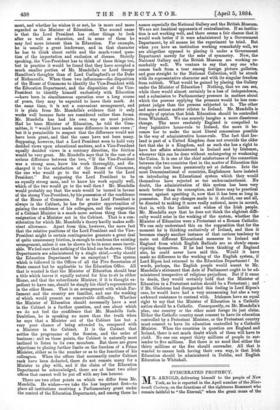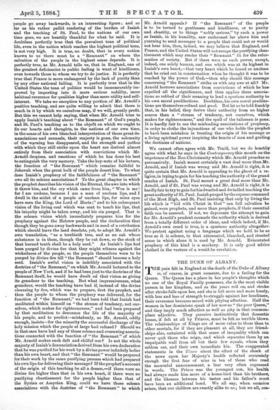EVISCERATED PROPHECY.
MR. ARNOLD, delivering himself to the people of New York, as he is reported in the April number of the Nine- teenth Century, on the functions of the righteous Remnant who remain faithful to "the Eternal," when the great mass of the people go away backwards, is an interesting figure ; and so far as Ids rather pallid rendering of the burden of Isaiah and the teaching of St. Paul, to the nations of our own time goes, we are heartily thankful for what he said. It is doubtless perfectly true that the prevalent tone of political life, even in the nation which reaches the highest political tone, is not very high. It is true, no doubt, that in every nation known to us there must be a " Remnant " on whom the salvation of the people in the highest sense depends. It is perfectly true, as Mr. Arnold tells us, that in England, one of the greatest deficiencies in public feeling is want of kindliness, even towards those to whom we try to do justice. It is perfectly true that France is more endangered by the lack of purity than by any other national failing It is perfectly true that in the United States the tone of politics would be immeasurably im- proved by importing into it more serious nobility, more habitual reverence for qualities higher than mere utility and self- interest. We take no exception to any portion of Mr. Arnold's positive teaching, and. are quite willing to admit that there is much in it by which we ourselves may, if we will, greatly profit. But this we cannot help saying, that when Mr. Arnold tries to apply Isaiah's teaching about "the Remnant" of God's people, and St. Paul's teaching as to the objet on which we ought to fix our hearts and thoughts, to the nations of our own time, in the sense of his own blanched interpretation of those great de- nunciations and counsels, their majesty is gone, the solemnity of the warning has disappeared, and the strength and pathos with which they still strike upon the heart are derived almost entirely from their association with convictions which Mr. Arnold despises, and emotions of which he has done his best to extinguish the very memory. Take the key-note of his lecture, the function of "the Remnant" which remains faithful to Jehovah when the great bulk of the people desert him. To what does Isaiah's prophecy of the faithfulness of "the Remnant" owe all its solemn associations F To the great chapter in which the prophet describes his vision of the Eternal, the awe into which it threw him, and the cry which came from him, "Woe is me r. for I am undone, because I am a man of unclean lips, and I dwell in the midst of a people of unclean lips, for mine eyes have seen the King, the Lord of Hosts ;" and to his subsequent vision of the living coal which was sent to touch his lips, that his iniquity might be taken away, and his sin purged. That is the solemn vision which immediately prepares him for the prophecy against the Hebrew people, and the declaration that though they be gone away backwards and in need of a retribution which should leave the land desolate, yet, to adopt Mr. Arnold's own translation, "as a terebinth tree, and as an oak whose substance is in them, though they be cut down, so the stock of that burned tenth shall be a holy seed." As Taaiah's lips had been purged by divine fire that they might witness against the wickedness of the people, so the people themselves were to be purged by divine fire till "the Remnant" should become a holy seed. Isaiah's awful vision is indelibly associated with the doctrine of "the Remnant," on which Mr. Arnold lectured to the people of New York, and if he had been just to the doctrine of the Remnant itself, he would have dwelt Oil that vision as giving its grandeur to the teaching. But what impressiveness, what grandeur, would the teaching have had if, instead of the divine cleansing by fire, which was to prepare, first the prophet, and then the people to whom the prophecy was delivered, for the function of "the Remnant," we had been told that Isaiah had meditated within himself on "the stream of tendency, not our- selves, which makes for righteousness," and had been prepared by that meditation to denounce the life of the majority of his people, and to predict—mistakenly, as Mr. Arnold, oddly enough, insists—for the minority the successful discharge of the holy mission which the people at large had refused? Should we in that case have had any of those solemn and overawing associa- tions connected with the function of "the Remnant" of which Mr. Arnold makes such deft and skilful use? Is not the whole majesty of Isaiah's denunciation derived from his own declaration that he was purified for his work by a divine power infinitely holier than his own heart, and that "the Remnant" would be prepared for their work by the same purifying process which had prepared his own lips for delivering their message? If the prophet's account of the origin of this teaching be all a dream,—if there were no divine fire higher than that in his own heart, if there were no purifying chastisement for the people higher than that of the Syrian or Assyrian King, could we have those solemn associations with the doctrine of "the Remnant" to which Mr. Arnold. appeals ? If "the Remnant" of the people is to be turned to gentleness and kindliness, or to purity and chastity, or to things "nobly serious," by such a power as Isaiah, in his humility, saw enthroned far above him and yearning to send messages to a people that could not or would not hear him, then, indeed, we may believe that England, and, France, and the United States will not escape the purifying chas- tisement which may render their " Remnant " fit for the refor- mation of society. But if there were no such power, except, indeed, one solely human, and one which was at its highest in Isaiah's own heart,—that very heart which he found so unclean that he cried out in consternation when he thought it was to be reached by the power of God,—then why should this message concerning "the Remnant" strike us with any awe at all P Mr. Arnold borrows associations from convictions of which he has expelled all the significance, and then applies these associa- tions so robbed of their meaning to lend a spurious authority to his own moral predilections. Doubtless, his own moral predilee- tions are themselves refined and good. But let us be told frankly that, in his belief, they derive their authority from no higher source than a "stream of tendency, not ourselves, which, makes for righteousness," and the spell of the talisman is gone. It is hardly fair to use the misleading associations of prophecy, in order to clothe the injunctions of one who holds the prophet to have been mistaken in treating the origin of his message an a living spiritual power inspiring the hearts of men and guiding the destinies of nations.
We cannot often agree with Mr. Trail], bat we do heartily agree with what he says in the Ocmtemporary this month on the impotence of the Neo- Christianity which Mr. Arnold preaches so persuasively. Isaiah meant certainly a vast deal more than Mr. Arnold, and if Isaiah was wrong and Mr. Arnold is right, it is quite certain that Mr. Arnold is appealing to the ghost of a re- ligion, in trying to gain for his teaching the authority of the grant oracles of Isaiah. St. Paul meant a great deal more than Mr. Arnold, and if St. Paul was wrong and Mr. Arnold is right, it is hardly fair to try to gain for his dwarfed and dwindled teaching the great authority of St. Paul. Isaiah purged by the express command of the Most High, and St. Paul insisting that only by living the life which is "hid with Christ in God" can full salvation be gained, were prophets, and more than prophets, if their essential faith can be assured. If not, we deprecate the attempt to gain for Mr. Arnold's prudent counsels the authority which is derived from a totally different order of ideas, and which indeed, if Mr. Arnold's own creed is true, is a spurious authority altogether. We protest against using a language which we hold to be as true as it is solemn, in that attenuated, blanched, and stunted sense in which alone it is used by Mr. Arnold. Eviscerated prophecy of this kind is a mockery. It is only good advice clothed in the vesture of a would-be revelation.















































 Previous page
Previous page